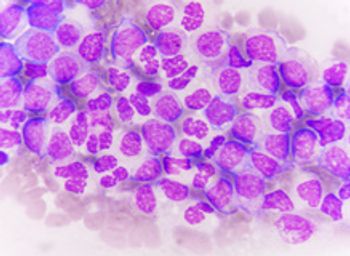
Rare Disease
Latest News
Latest Videos

CME Content
More News

A multicenter study supports the use of ruxolitinib in steroid-refractory and steroid-dependent chronic graft-versus-host disease, adding to promising clinical trial findings.

The report is the first recorded case of acute respiratory distress syndrome (ARDS) that required venovenous extracorporeal membrane oxygenation and was complicated by spontaneous spleen rupture.

Although the understanding of chronic graft-versus-host disease (GVHD) has improved in recent years, more work is needed to facilitate personalized treatments for patients after hematopoietic stem cell transplantation (HSCT).

A recent study supports the notion that non–driver mutations in essential thrombocythemia (ET) and polycythemia vera (PV) have predictive value and found that a proposed international prognostication model may be useful for Japanese patients.

JAK2-unmutated erythrocytosis has a variety of etiologies, and identifying the underlying cause may prove helpful in cases where it is secondary to another condition such as polycythemia vera.

Although no pharmacological treatment offers long-term efficacy or extends survival with Huntington disease at this point, research suggests that stem-cell therapy holds promise in this and other neurodegenerative diseases.

Despite the use of therapies to address the clinical manifestations of myelofibrosis (MF) and essential thrombocythemia (ET), the symptom burdens of these conditions continue to negatively affect patient quality of life (QOL).

The review highlighted key diagnostic and treatment considerations for patients with splanchnic vein thrombosis and myeloproliferative neoplasms.

The authors propose conducting a scenario analysis for interventions to treat rare diseases by varying health plan size to demonstrate the variability of potential budget impact.

A decision to rename myeloproliferative neoplasms led to a plethora of developments in a space where there was once little interest.

The gene therapy is the first treatment for active cerebral adrenoleukodystrophy, a fatal neurodegenerative disease that affects boys.

A review published in Frontiers in Oncology explored the application of allo-SCT for myelodysplastic syndromes and myeloproliferative neoplasms.

A Texas judge ruled that HIV pre-exposure prophylaxis (PrEP) coverage under the Affordable Care Act is unconstitutional; an FDA advisory panel recommended the approval of an experimental drug for amyotrophic lateral sclerosis (ALS); Walmart and UnitedHealth Group are collaborating to provide preventive health care for older Americans.

The management of myeloproliferative neoplasms (MPNs) in adolescent and young adult (AYA) patients is currently similar to that of older patients. However, comprehensive research is needed to form guidelines for this younger population.

Olipudase alfa (Xenpozyme) was granted FDA approval for patients with Acid Sphingomyelinase Deficiency (ASMD); Moderna and Pfizer-BioNTech’s bivalent COVID-19 vaccines are each authorized for use as a booster dose; people with type A blood have an 18% higher risk of stroke before age 60, compared with other blood types.

The FDA Friday approved pemigatinib (Pemazyre), a selective fibroblast growth factor (FGFR) inhibitor, to treat adults who have relapsed or refractory (R/R) myeloid/lymphoid neoplasms (MLNs) with FGFR1 rearrangement, a very rare and aggressive cancer.

Systemic mastocytosis and mast cell activation syndrome both negatively impact health-related quality of life (HRQOL), with mast cell activation syndrome patients reporting more significant impacts on everyday life.

Early genomic testing could identify the children who are most at risk and provide opportunities to intervene as early as possible.

The rarity of sinonasal cancers presents various challenges for advancing disease management.

The recommendations follow the World Health Organization’s recent update to its classifications of central nervous system (CNS) tumors to now include a structure for pediatric patients with CNS tumors.

Despite the known potential benefits of newborn screening, the exact long-term clinical benefits and cost-effectiveness in large cohorts remain uncertain due to a lack of large-scale longitudinal research.

For the first time, the CDC has identified in Mississippi dirt and water samples a bacteria that causes a rare and sometimes fatal disease called melioidosis, which is common in low-income tropical countries and one that scientists have been warning about for several years.

A recent survey of patients with urticarial vasculitis found that quality-of-life (QOL) impairment is an important factor to consider when putting disease management plans in place.

Clonal cytopenias of undetermined significance often manifest prior to myelodysplastic syndromes (MDS), and a recent study found similarities in the cytokine profiles of the distinct conditions.

The combination regimen delivered better overall survival and response rates among patients with myelodysplastic syndromes (MDS).
















